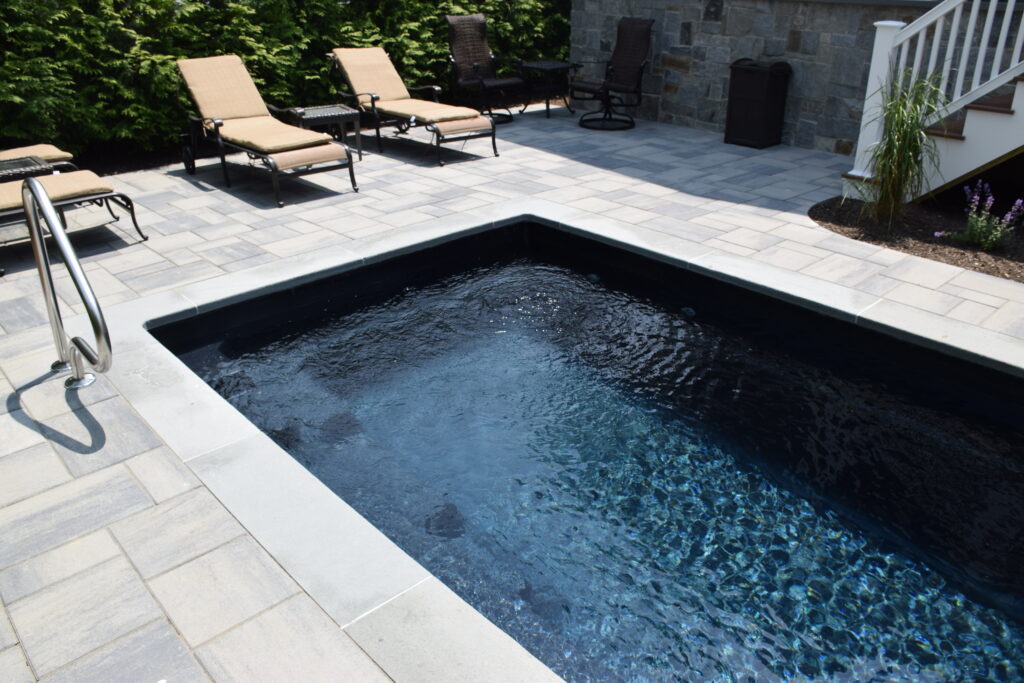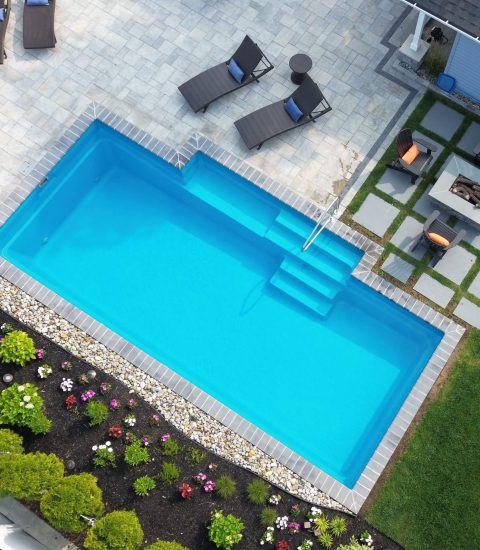Are Fiberglass Swimming Pools Easy to Maintain?
Many dream of getting an inground swimming pool and having a sparkling oasis right at home. However, many also fear the maintenance and upkeep involved with owning a swimming pool. In recent years, fiberglass swimming pools have gained traction as a highly sought-after alternative to classic concrete or vinyl liner swimming pools due to their low maintenance appeal. In this article, we will discuss the reality of maintenance and upkeep when dealing with fiberglass vs vinyl or gunite pools.
Routine Maintenance
- Water Balance
Every swimming pool requires routine maintenance, regardless of whether it is inground or above ground, vinyl, fiberglass, or gunite, salt or non-salt generated. Properly balanced water chemistry is mandatory for creating a safe and healthy swimming environment for your friends and family. Proper sanitation eliminates harmful bacteria that can cause illness, skin conditions, and other unwanted issues.

Fiberglass Maintenance Tips
Properly balanced water chemistry is also required to maintain manufacturer warranties and to prevent premature destruction to your equipment, pool surfaces, and surrounding. For example, high corrosive water, as determined by an extremely low PH level, will rot out pumps, heaters, salt chlorine generating systems as well as fade and destroy vinyl liners, discolor fiberglass pool shells, and etch and erode plaster finishes on gunite pools. High calcium levels can cause scale build up which will clog filters and salt chlorine generators, restrict flow and circulation, and adhere itself to gunite plaster finishes. By ensuring you are properly maintaining your swimming pool water chemistry, you are saving time and money.
- Vacuuming & Skimming
A stunning and well-maintained pool requires routine skimming, vacuuming, and cleaning. Skimming the surface prevents leaves and debris from sinking to the floor and reduces the amount of debris that will be caught in the automatic skimmer. An over clogged skimmer basket can prevent proper water flow from getting to the pump, and can even cause the pump to turn off due to lack of water. It is important to clean out baskets on a regular basis.
Vacuuming helps to clean the floor and walls to get rid of accumulated dirt and debris. This not only helps improve the appearance of your swimming pool, it helps keep the water chemistry in check. Large piles of leaves will break down if not removed from the water and will eventually reduce PH and alkalinity levels in the water, forcing chlorine to work harder than usual to sanitize the pool. Keeping main drains clear of debris will also ensure that the equipment is receiving proper flow and circulation.
- Using an Automatic Pool Cover
Many homeowners choose to install automatic pool covers to assist with keeping unwanted leaves and debris out of their swimming pool. These covers also great reduce evaporation, leading to lower heating and chemical usage costs. However, if not properly ventilated, trapped chemical gases and heat can destroy pool surfaces. Vinyl liners can fade and wrinkle prematurely, fiberglass pool shells can strip of their color, and gunite pool finishes can etch, fade, or scale quickly.
Is Fiberglass Less Work?
All of the previously mentioned maintenance items need to be considered regardless of the type of pool you choose. But a fiberglass swimming pool can be much less work when compared to a vinyl liner or gunite swimming pool.
When compared to gunite, fiberglass pool walls are non-porous and very smooth. There is less opportunity for algae to grow and for calcium scale to adhere. Brushing a fiberglass pool is much easier, requiring a simple poly bristle brush and minimal exertion. A gunite pool requires a wire bristle brush and is much more labor intense to brush due to its rough, porous nature. Brusing a fiberglass is also not required on a weekly basis while many gunite pool finishes recommend weekly brushing to reduce the risk of scaling.If gunite pools are not maintained appropriately, they will require an acid washing, repolish, or even replaster many years down the road, whereas fiberglass pools only need to be resurfaced or replaced in EXTREME cases.
When comparing to a vinyl liner swimming pool, fiberglass pools are more difficult to damage. When adding chemicals to any swimming pool, it is recommended they be properly diluted and mixed before adding. However, mistakes get made and in such cases, you are more likely to create damage to a vinyl liner than the surface of a fiberglass swimming pool. Liners fade over time from sun exposure and chemical exposure, and can even absorb stains from organic debris such as leaves and acorns. Fiberglass pools are non-porous and are much less likely to develop staining.
Vinyl liners degrade over time and are generally replaced every 8-12 years, depending on care. This replacement requires the water to be drained, liner to be measured and replaced, and the pool to be refilled. This can cost a homeowner in 2024 on average $4000-7000. Fiberglass swimming pool surfaces are good for the lifetime of the pool, which is generally 30+ years.
In conclusion, if you are looking for the lowest cost and labor maintenance swimming pool available, a fiberglass swimming pool is what you are looking for. Their non-porous surfaces are less prone to algae growth, fading, and are more damage resistant then other swimming pool types on the market today.
